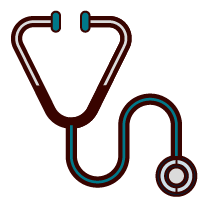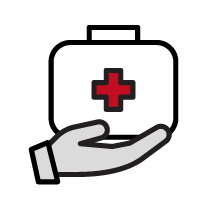3 Kidney-Related Questions to Ask Your Doctor if You Have Diabetes
Communication Is Important
Health care is a team effort and you play an important role. You can make sure you get the best possible care by talking with your doctor and asking questions.
Keep reading to learn why asking your doctor the right questions is an important part of your diabetes management.

How Are the Heart, Kidneys and Diabetes Connected?
Your kidneys are powerful filters that remove toxins from your blood through your blood vessels (arteries, veins, and capillaries)—which are part of your cardiovascular system.
Type 2 diabetes can put a lot of stress on both your heart and in your kidneys. If you have type 2 diabetes and develop kidney disease, you’re at 3x higher risk of dying from a cardiovascular event like a heart attack or stroke. To stay healthy, it’s important for you and your doctor to manage your risk of both.
Asking questions about your diagnoses, treatments and medications is one of the best ways to lower your risk for diabetes-related complications like heart disease, stroke and kidney disease.

Preparing for Your Appointment
You can prepare for your appointment by thinking about what you want to do during your next visit.
Do you want to:
- Start or change a medicine?
- Get medical tests?
- Talk about lifestyle changes and treatment options?
Write down your questions in your phone or a notepad to help you feel prepared and less rushed during your appointment.
During Your Appointment To get the most from your visit, tell the nurse or person at the front desk that you have questions for your doctor. If your doctor does not ask if you have questions, ask your doctor when the best time would be to ask them. Start by asking the ones that are most important to you.

3 Kidney-Related Questions to Ask Your Doctor if You Have Diabetes
Asking questions is important but so is making sure you hear—and understand—the answers you get. Take notes or ask to record them on your phone or another device. If you want to bring someone to your appointment to help you understand and remember what you heard, call and ask the doctor’s office ahead of time if that’s okay. If you don’t understand or are confused, ask your doctor to explain the answer again.
3 Questions to Prevent Kidney Disease
- Have I received my annual urine albumin-creatinine ratio (UACR) screening?
- What signs or symptoms of kidney disease should I be aware of?
- How do I take care of my kidneys and reduce my risk for heart disease and stroke?
It is very important to understand the next steps your doctor recommends. Ask more questions, if you need to, and make sure you know what your doctor wants you to do. Asking for written instructions, brochures, videos, or websites may also help you learn more.

Understand the Answers and Next Steps
After you meet with your doctor, you will need to follow the instructions to keep your health on track. You may need to follow up on your care and call your doctor. Call your doctor if:
- You have side effects or problems with your medications.
- Your symptoms get worse after your appointment.
- You get new prescriptions from other members of your health care team or start taking any over-the-counter medicines.
- You need the results of any tests you’ve had. Don’t assume that no news is good news—be proactive.
- You don’t understand your test results.
Asking questions can help your health care team learn more about you. Their answers can help you make better decisions, receive a higher level of care, prevent symptomless diabetes-related complications like kidney disease and feel better about the care you receive.
If you have diabetes, good communication with your health care team is key. There are questions you can ask to reduce your risk of kidney disease, heart disease and stroke. Talk to your doctor, be curious and, most importantly, make sure you understand the answers.




